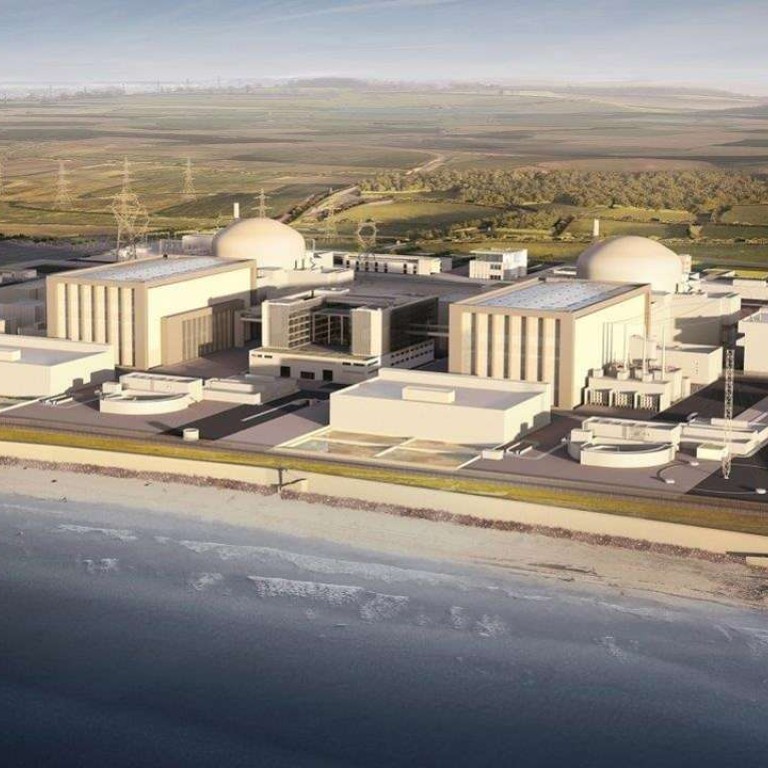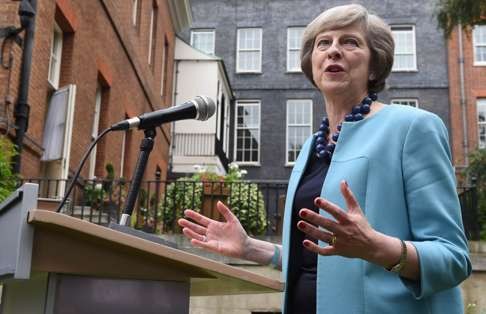
UK’s surprise deferral on nuclear plant decision deals blow to China’s overseas ambitions
The surprise decision by the new British government to defer a final investment decision on a US$24 billion nuclear plant has casts a shadow over the globalisation strategy of China’s commercial nuclear industry.
The deal, if rejected by UK Prime Minister Theresa May and her cabinet who took office just over two weeks ago, could seriously threaten the industry’s chance to showcase a Chinese-designed and built nuclear power station in a developed nation for the first time.
“The immediate impact is not great because China is only one of the investors in the Hinkley Point C project and Chinese firms would only be among many sub-contractors for its construction,” said Xiamen University Centre for China Energy Economics Research director Lin Boqiang.
“But it would be a blow to the wider Chinese nuclear energy industry’s going-out strategy, especially in developed nations.”
Still, it would not affect the industry’s strategy to build projects elsewhere, since Chinese firms have the biggest projects in the pipeline and are the most experienced in building new reactors globally in the past two decades, he noted.
“Going out is a must for the industry, it is just a matter of pace and timing,” he said.
Under the preliminary investment agreement signed last October, Chinese firms’ investment in Hinkley Point could have opened the door to their designing and constructing a future second nuclear project at Bradwell, Essex in southeast England.

Hu Xinmin, senior manager at electricity industry consultancy The Lantau Group, said while Chinese firms have won rights or inked preliminary agreements to build projects in developing nations like Pakistan, Argentina and Romania, success in a developed nation like Britain would go much further in proving Chinese nuclear prowess.
In a preliminary agreement signed in October, CGN, rival China National Nuclear Corp and other unnamed Chinese investors were to take a combined 33.5 per cent stake in the planned 3.2 giga-watt Hinkley Point C project in Somerset, southwest England. The rest would be owned by French state-owned nuclear power firm EDF.
The plant would use the French EPR third-generation technology, which has yet to be proven in commercial operation.
EPR plants under construction in Finland, France and China have already seen their completion schedules slip by two to eight years. The plants in France and Finland also suffered major cost blow-outs.
Hinkley Point would be the first new nuclear power plant to be built in Britain in over 20 years. It was billed by the government of former Prime Minister David Cameron as the first nuclear plant in the nation that would not be built using taxpayers’ money, and could create 25,000 jobs.
The plant, capable of providing 7 per cent of Britain’s power needs, would also be “an excellent deal” for British consumers, Cameron’s government claimed at the time.
But the project, which benefits from a guaranteed power selling price to the government of £92.5 per mega-watt-hour, has been criticised as too costly to consumers given currently much lower prices of wholesale power, including other clean energy like solar and wind.
Hu said compared to years ago when Hinkley Point was planned, solar and wind power has become much more price competitive, and has become easier to be absorbed by power grids despite their intermittence, thanks to the advent of smart power grid technologies.
It would be a blow to the wider Chinese nuclear energy industry’s going-out strategy, especially in developed nations
“Britain’s power supply reserve margin has also been augmented by recent grid inter-connections with France and more connections are slated to be made with other Western European nations, which would also reduce the urgency to build big nuclear plants,” he added.
In a surprise setback to the project, May’s government last Friday said it would put its final decision on the Hinkley Point project on hold until autumn, saying it needed more time to review the project.
London’s decision came shortly after EDF’s board narrowly voted to move forward with the project, after deferring its approval by months amid a major decline in profit and challenges in financing the plant.
It also came a day ahead of the planned signing of contracts between EDF, the Chinese investors and the UK government.
The primary reason for postponing the decision was security concerns over Chinese ownership of British nuclear power stations, according to a BBC report.
The Telegraph quoted former business secretary Vince Cable as saying May has long had security concerns over China’s involvement in Hinkley Point, while the Guardian quoted him as saying May had been unhappy about former chancellor George Osborne’s “gung-ho” attitude to Chinese investment.
CGN said in its official microblog that it understood and respected that the new British government needs more time to familiarise itself with the project.
CGN, the nation’s largest reactor builder, was eyeing opportunities to build nuclear plants in 13 nations in Southeast Asia, Eastern Europe and Africa, the firm’s deputy general manager of international nuclear power business development told the Post in February.

